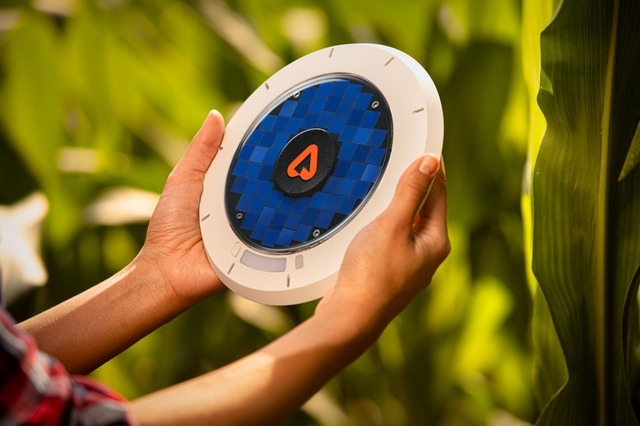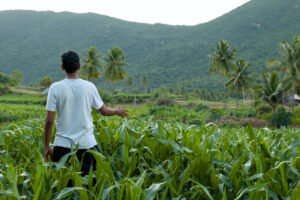Farmers make many decisions during a growing season, many of which revolve around when in the year to perform activities like planting, harvesting, and applying crop protection products. For crop protection, calculating when and how much to apply can determine the success of the crop. But with ever-squeezed margins and increasing pressure from consumers, regulators and environmentalists to use less of these products, farmers and their suppliers are looking for ways save.
Fortunately many new agtech offerings focus exactly on that. One of them is Xarvio, a digital tool focusing on fungicides that was developed by Bayer and sold to BASF as part of the Bayer-Monsanto merger. While used predominantly in Europe, its free Scouting app, which identifies crop disease from photos, is touted as one of the best available and has been downloaded over two million times. Xarvio’s second offering Field Manager enables growers to proactively manage their crop protection by sending updates on their crop health status and getting feedback on when to apply protection products and which areas in a field require more or less. Costs apply to some of Field Manager’s services.
Partnering with Arable
Field Manager’s algorithms are based on a variety of data sources, including satellite imagery, drone imagery, weather data and soil type. Xarvio is working to boost the weather data component through a partnership with Arable, a real-time crop management platform that uses sensors to collect and analyze hyperlocal, in-field data.
Arable’s latest sensor, called Mark 2, sits above a crop’s leaf canopy and captures 40 data streams including rain, canopy leaf area, crop water demand, environmental stresses and microclimate. The multi-spectral sensing capabilities of the Mark bring real-time insight into how plants are responding to observed field conditions. That data is now feeding into Xarvio’s Field Manager algorithms.
The partnership is a result of a two-year trial between the two companies across hundreds of locations in Argentina, Brazil, France, Germany, and Great Britain. During the trial, Arable and Xarvio noticed that farmers engaged with the app twice as often as previously throughout the growing season, because they were able to collect better insights on what was happening in their fields, said Jim Ethington, CEO of Arable.
“The match was clear from the beginning,” Ethington offered. “The recommendations they provide about disease risk and field conditions are really predicated on excellent knowledge of what’s happening in that field. Disease models are driven by observations of temperature, humidity and so on and spray conditions are driven by many of the same things, including the growth stage of the crop; these are things we do at Arable.”
He added: “I think the simplicity and ease-of-use of the Mark compared to other systems – that arrive in a box the size of dishwater, take three hours to put together, and require regular maintenance – also made us a good fit.”
The combined offering will be available initially in France, Germany, Great Britain, Poland and Ukraine.
“Arable has worked really hard on user experience and produced some great results,” said Jeff Spencer, BASF’s digital farming head of technology. “We know we can’t do this alone and that we need partners. We could bring in another related to weather, but Arable’s is unique in combining weather and environmental data.”
“We see this as a perfect marriage,” added Sanjeev Krishnan from S2G Ventures, a lead investor in Arable. “Arable is the leader in field sensing and analytics, and Xarvio is the leader in crop protection and spraying decision tools, which need robust data about what’s happening in the field. Arable’s simplicity, ease of use and the broad breadth of data makes it unique in the market.”
He continued: “We are also excited to see the top players in digital ag partnering and executing seamless integrations. It provides farmers a better product experience and marks a further maturation of the industry.”
Less is more
But why would a manufacturer and distributor of crop protection products want to help growers to use less?
If one were to ask BASF or other ag majors and crop input companies, they would likely say they want to improve the sustainability of the agriculture industry or that they’re motivated by growers’ success. That may be true, in part. But what’s more certain is that is where technology and competition are pushing them — more of an “if you can’t beat ’em, join ’em” situation.
Digital subscription revenues are unlikely to make up for the shortfall in product sales, however; so several major ag product companies are trialing new business models to capture some of the upside from their farmer clients’ success. Often known as outcome-based pricing, these models involve companies selling products based on their potential to achieve a certain yield or minimize field disease or weeds. If that outcome isn’t achieved, farmers get compensated. If it is achieved, product companies share the upside with the farmers.
The strategy isn’t a far cry from Boston-based startup Indigo Ag’s business approach, which provides farmers with the company’s microbe-treated seeds and guarantees a certain price for it.
Bayer has been trialing a yield guarantee offering. BASF recently launched trials of Healthy Fields in Germany, which guarantees against disease outbreak. And Syngenta is trialing its AgriClime risk-sharing program in Australia, where the company shares the risk of rainfall during specific months.
All of these offerings rely on the recommendations and estimates produced by their in-house digital tools.
Spencer noted that in their pilot they would be evaluating the exact metrics tied to field performance. The website suggests that Healthy Fields actually removes all the decision-making from the farmer, giving it over to a contractor, which is selected by Xarvio or the farmer. Does that mean Heathy Fields is using contract farming or even farming-as-a-service that’s gaining traction in emerging markets? Too soon to tell, but there’s more reading available on it here.
“Healthy Fields is us ensuring that if you follow the Field Manager recommendations on dosing and timing, we would insure the outcome of those decisions. We insure that the field will be disease-free,” explained Spencer.
“We want to give farmers financial confidence in the applications we’re recommending,” he continued. “It’s important to highlight that we’re product agnostic. BASF might not have the best product for the situation, but if it makes sense, we will recommend ours.”
Spencer added that BASF does not facilitate purchases of third party products at this point; farmers would purchase them through their typical retailer.
Xarvio has partnered with other agtech startups too, such as Hummingbird Tech in the UK, which uses remote sensing (mostly drone-based images) to provide similar insights around in-season activities. BASF made an investment into the startup as part of the partnership, which we reported here.
If you want to learn more about outcome-based pricing, our friends at Successful Farming did a great, deep-dive here.





